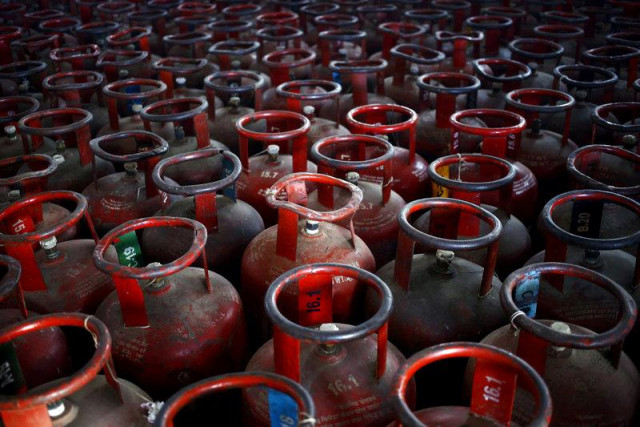As winter approaches, OGRA asks K-P to stop LPG decanting
Regulator warns natural gas shortage will lead to a rise in the hazardous practice

Empty Liquefied Petroleum Gas (LPG) cylinders are seen at a gas distribution centre. PHOTO: REUTERS
The regulator has sent a letter to the K-P chief secretary, asking him to take cognisance of the issue and take firm action against LPG decanting and unregistered cylinder manufacturers to ensure public safety.
Gas firms allowed to recover more losses from consumers
“Decanting of LPG from cylinder to cylinder at LPG distributors’ premises and manufacturing of substandard LPG cylinders are illegal and matters of grave concern,” Ogra said.
Owing to the approaching colder weather, the LPG consumption will increase significantly due to shortage of natural gas, which may lead to increased LPG decanting and manufacturing of substandard LPG cylinders.
Officials in the K-P government, who deal with the issue, told The Express Tribune that directives had been issued to district administrations and deputy commissioners to stop the hazardous practice in their districts.
The K-P government failed to stop the decanting of compressed natural gas (CNG) in Karak district when Ogra asked it to look into the matter in May 2017.
Officials aware of the matter said a citizen in the district complained about the decanting of gas from CNG tanker trucks to public transport and private vehicles at a filling station in Karak.
“The CNG filling station was getting gas supply through big tanker trucks and then decanting it directly to CNG-operated vehicles. The citizen called it a threat to public safety,” an official said requesting anonymity.
Government rules out gas price increase from July
“We referred the matter to the deputy commissioner and he summoned both the complainant and the CNG station owner after which he wrote to us that he has no authority to take action against the latter since the matter falls within the jurisdiction of chief inspector of explosives.”
The official said the situation was still the same with gas stations getting CNG from tanker trucks and then filling CNG in vehicles directly from the tankers.
“We will refer the matter again to district administrations as they are responsible for these matters,” he said.
Published in The Express Tribune, October 13th, 2017.
Like Business on Facebook, follow @TribuneBiz on Twitter to stay informed and join in the conversation.



















COMMENTS
Comments are moderated and generally will be posted if they are on-topic and not abusive.
For more information, please see our Comments FAQ